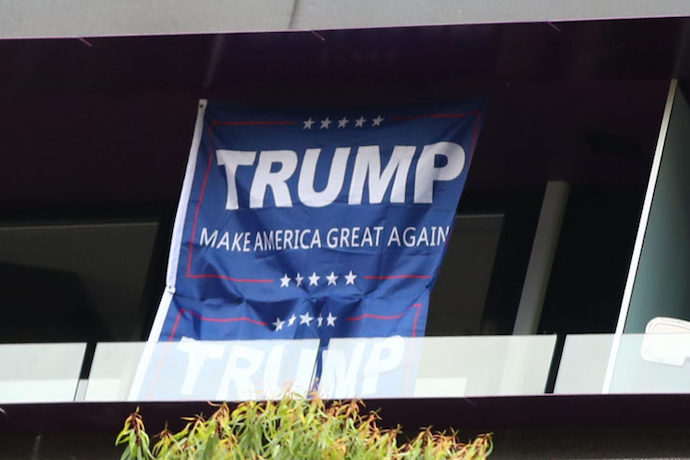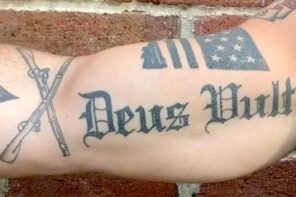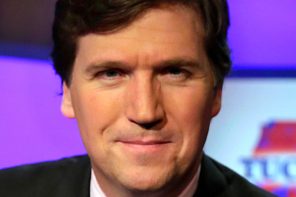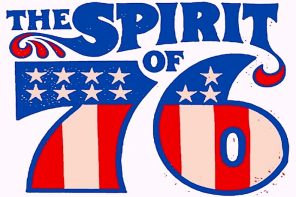In the wake of the terrorist attacks on two Muslim mosques in New Zealand by Brenton Tarrant, many are looking to address the motivations and influences underlying the violence. In two RD posts, one from March 18 and another from March 22, Murali Balaji argues that the attacks were rooted in white Christian nationalism. But is Balaji defining Christian nationalism correctly, and is it the best way to characterize Tarrant’s ideological narrative? I will argue below that the answer is “no” to both questions.
To the question of defining Christian nationalism, there is a helpful body of academic research in political science and the social sciences relevant to this. The lead researchers in one study argue that “the conservative strain [of American civil religion] views America as holding a unique covenant with God, which requires it to be protected from outsiders and those who would do it harm. We refer to these ideas more generally as Christian nationalism.” Contrary to Balaji’s assertions in his second essay, Christian nationalism is religious, and it incorporates theological elements. This results in perceptions of “divinely anointed” Christian ingroup members vs. “theologically condemned” outgroup members like Muslims. This fusion of religious and national identities is noteworthy among white American evangelicals, where being Christian is very important to being truly American. This was the Christian nationalism that was a significant factor for white evangelicals who voted for Trump in 2016.
By contrast there are other forms of nationalism. The type associated with white supremacy, sometimes called white nationalism, is concerned with ethnocentrism and the superiority of the white race. Both white nationalism and Christian nationalism have shared concerns about “cultural displacement,” and involve prejudice toward immigrant populations, sometimes seen as “invaders,” manifested in anti-immigrant and anti-Muslim attitudes. But these two forms of nationalism, even with some shared fears, are not the same thing. So Balaji does not define Christian nationalism correctly and conflates it with other forms of nationalism.
To the second question, what type of nationalism did Tarrant espouse? Before his attacks, Tarrant posted a 74-page document on the internet. According to J.M. Berger, an expert in online extremism, Tarrant’s manifesto is “clearly a statement of ideology,” described as white nationalist, and the author “is a white supremacist, and anti-immigration and anti-Muslim.” There is no indication in Berger’s analysis that Tarrant included statements that would characterize his ideology as a form of Christian nationalism.
If Christian nationalism is not the proper way to understand Tarrant’s nationalism, but instead a form of white supremacist nationalism is more accurate, where did the major anti-immigrant influences come from? According to Sasha Polakow-Suransky and Sarah Wildman at Foreign Policy, Tarrant draws upon the work of Renaud Camus, a French anti-immigration writer. They note that while Tarrant was in France at a mall watching immigrant “invaders,” the idea came to him to use violence against nonwhites. Polakow-Suransky and Wildman quote from Tarrant’s manifesto illustrating the emotional impact this had on the soon-to-be mass murderer: “I found my emotions swinging between fuming rage and suffocating despair at the indignity of France, the pessimism of the french [sic] people, the loss of culture and identity and the farce of the political solutions offered.”
It would seem that Balaji has identified the wrong type of nationalism in connection with the New Zealand terrorism. White nationalism provided the ideological narrative, not Christian nationalism.
In the interests of full disclosure, I identify as a Christian. But my disagreement and critique of Balaji’s thesis should not be interpreted as a failure to accept criticism of those in my religious tradition. For the last four years I have been pursuing a grant from the Louisville Institute that has brought social psychology into conversation with American evangelical theologies of opposition to religious others, particularly Muslims. Among the contributing factors, our research indicates that Christian nationalism is a significant predictor of negative attitudes toward Muslims. I accept this, and advocate strategies to counter this narrative so as to foster more positive forms of multifaith interaction.
Christians have behaved badly, and pursued violence toward others, in the name of their religion. That’s beyond dispute. But whether Christian nationalism was the ideological narrative underlying New Zealand’s attacks, that’s another question. And it’s one that I think Balaji misidentified. If we misdiagnose the challenges we face we will create inappropriate strategies to counter them, and possibly foster even more tensions between Christians and Muslims.
***
Murali Balaji responds:
Following my first and second pieces in Religion Dispatches, several evangelical leaders have offered thoughtful critiques of my position that the New Zealand terrorist (whom I will not name) is a white Christian nationalist.
John Morehead writes in his response that I mislabeled anti-immigrant white nationalism as “Christian nationalism,” asserting that “White nationalism provided the ideological narrative, not Christian nationalism.”
I respectfully disagree.
For starters, I emphasized that a white Christian nationalist doesn’t necessarily have to be “religious” in the traditional sense. I would argue that Donald Trump and Mike Pence are both white Christian nationalists, though the former hardly has any attachment to the actual theology of Christianity.
In this regard, white Christian nationalists draw upon and reference a pure white Christian ideal—one that arguably never existed anywhere. If we reference Benedict Anderson’s notion of imagined communities, the white Christian ideal becomes an affinity that helps to build a collective identity.
The terrorist’s manifesto also makes reference to Pope Urban II and the First Crusade, implying that he fancied himself part of a holy war against Muslims and other invaders. While Morehead’s argument seeks to clearly distinguish between white nationalism and Christian nationalism, the terrorist’s own words seem to undercut this attempt.
“We are coming for Constantinople and we will destroy every mosque and minaret in the city,” the terrorist wrote in his manifesto. That’s not subtle in its call for Christian supremacy and destruction of Islam.
I sympathize with Morehead’s position, but the terrorist seems to make both implicit and explicit references to a dream that many white Christian nationalists share: a return to white Christian dominance over its non-white, non-Christian others.





